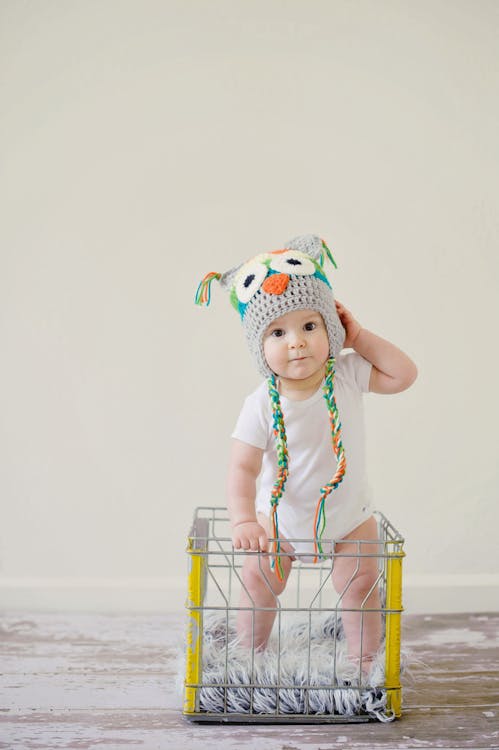Table of Contents
- First Things First: What Exactly *Are* Hiccups?
- Why Do Newborns Seem to Hiccup All the Time?
- Common Causes and Triggers of Newborn Hiccups
- Gentle Remedies: How to Stop Baby Hiccups (or Just Comfort Them)
- Can You Prevent Newborn Hiccups?
- When Should You Worry About Baby Hiccups?
- The Takeaway: Embrace the Hiccups (Mostly!)
*Hic!* Oh, Hello There! Understanding Newborn Hiccups: Causes, Comforts, and Calm
You’re gazing adoringly at your tiny newborn, marveling at every little coo, wiggle, and sigh. Then suddenly… *hic!*… *hic!*… *hic!* Those rhythmic little spasms start, and while your baby might seem completely unfazed, you might find yourself slightly bewildered, perhaps even a little worried. Are they okay? Are they uncomfortable? How do I make them stop? Welcome to the world of newborn hiccups, a common, usually harmless, and often quite cute phenomenon that nearly every parent encounters.
Those little *hic* sounds might tug at your heartstrings or leave you searching frantically for answers. Rest assured, you’re not alone. Most infant hiccups are perfectly normal and simply a sign that your baby’s tiny systems are still figuring things out. But understanding *why* they happen and knowing a few gentle ways to offer comfort can make these episodes less stressful for you and potentially shorter for your little one. Let’s dive deep into the world of baby hiccups, exploring the causes, uncovering gentle remedies, and learning when (and if) you should be concerned.

First Things First: What Exactly *Are* Hiccups?
Before we tackle the baby-specific aspects, let’s quickly understand hiccups in general. Whether in a newborn or an adult, a hiccup is essentially an involuntary spasm (a sudden contraction) of the diaphragm muscle. The diaphragm is a large, dome-shaped muscle located at the base of the chest cavity, just below your lungs. It plays a crucial role in breathing.
Here’s the sequence of events during a hiccup:
- Diaphragm Spasm: The diaphragm suddenly contracts involuntarily.
- Quick Inhalation: This spasm causes a rapid intake of air.
- Glottis Closure: Almost immediately, the glottis (the opening between the vocal cords) snaps shut.
- The *Hic* Sound: The characteristic ‘hic’ sound is produced by the air hitting the closed glottis.
So, while they might sound funny or feel strange, hiccups are a physical reflex action involving the diaphragm and vocal cords. In adults, they can be triggered by eating too fast, drinking carbonated beverages, or even sudden excitement. For babies, the triggers are often related to feeding and their still-developing systems.
Why Do Newborns Seem to Hiccup All the Time?
If it feels like your newborn hiccups more than everyone else in the house combined, you’re probably right! Infant hiccups are incredibly common, much more so than in older children and adults. There are several reasons for this increased frequency:
1. Immature Nervous System Control
A baby’s central nervous system, which controls reflexes like hiccuping, is still under development. The nerves controlling the diaphragm might be easily triggered or less coordinated, leading to more frequent spasms. Think of it like a brand-new operating system still working out the kinks – sometimes, signals get crossed or fire off unexpectedly.
2. Developing Digestive System
The digestive tract of a newborn is also immature. The coordination between sucking, swallowing, and breathing isn’t always perfect yet. This can lead to situations that irritate the diaphragm, which sits right above the stomach.
3. Sensitivity to Stomach Distension
A baby’s stomach is tiny! When it fills up quickly during feeding, it can distend and press upward against the diaphragm, potentially irritating it and triggering those tell-tale hiccups. This is a primary reason why hiccups often occur during or shortly after feeding.
4. Practice from the Womb!
Did you know that babies often hiccup *before* they are even born? Many expectant parents feel rhythmic little jumps or pulses in their belly during the later stages of pregnancy – those are often fetal hiccups! It’s thought to be part of the developmental process, possibly helping to strengthen the diaphragm and prepare the respiratory system for breathing outside the womb. So, in a way, your baby is already a seasoned hiccup pro by the time they arrive!

Common Causes and Triggers of Newborn Hiccups
While the underlying cause is the diaphragm spasm, certain situations make newborn hiccups more likely. Understanding these triggers can help you manage and sometimes even prevent them.
Feeding Frenzy: Overfeeding or Feeding Too Quickly
This is perhaps the most common culprit. When a baby drinks milk (breast milk or formula) very quickly or takes in too much volume at once, their small stomach expands rapidly. This sudden expansion can push against the diaphragm, causing irritation and triggering hiccups.
- Breastfeeding: A very fast let-down reflex can cause the baby to gulp milk quickly.
- Bottle-feeding: An incorrect nipple flow rate (too fast) can lead to the baby drinking too rapidly. Holding the bottle at too steep an angle can also increase flow speed.
Gulping Air: Aerophagia
Swallowing excess air during feeding (aerophagia) is another major trigger. The trapped air bubbles can distend the stomach, similar to overfeeding, leading to diaphragm irritation.
- Breastfeeding: A poor latch can cause the baby to swallow air along with milk. Ensure the baby has a deep latch, covering a good portion of the areola, not just the nipple.
- Bottle-feeding: If the nipple isn’t kept full of milk, the baby can suck in air. Using bottles designed to reduce air intake (vented or angled bottles) might help. Shaking formula vigorously can also introduce air bubbles; swirling gently is often better.
Sudden Temperature Changes
Sometimes, a sudden drop in temperature can trigger hiccups. This might happen when you undress your baby for a bath or diaper change in a cool room. It’s thought that the sudden change might cause a gasp or change in breathing pattern that affects the diaphragm. Similarly, feeding a baby cold milk or formula (though room temperature or warm is generally recommended) could potentially trigger hiccups in sensitive infants, possibly by causing a sudden temperature change in the esophagus near the diaphragm.
Excitement or Agitation
Strong emotions, even happy ones like excitement or giggling, can sometimes lead to hiccups in babies. The change in breathing patterns associated with getting worked up can potentially set off the diaphragm.
Gastroesophageal Reflux (GER)
In some cases, frequent or persistent hiccups can be linked to gastroesophageal reflux (GER). This is when stomach contents (milk and acid) flow back up into the esophagus. The irritation of the esophagus, which passes near the diaphragm, can trigger hiccups. GER is common in infants and usually resolves on its own, but if hiccups are accompanied by significant spitting up, discomfort, arching of the back, or poor weight gain, it’s worth discussing with your pediatrician. This is often referred to as Gastroesophageal Reflux Disease (GERD) when it causes troublesome symptoms or complications.
Gentle Remedies: How to Stop Baby Hiccups (or Just Comfort Them)
Okay, the *hic*s have started. What can you do? Firstly, remember that most hiccups bother parents far more than they bother babies. If your little one seems happy and content despite the rhythmic spasms, you often don’t need to do anything at all! They will usually resolve on their own within a few minutes (though sometimes they can last longer).
However, if the hiccups seem persistent or if your baby appears uncomfortable, here are some gentle techniques you can try to potentially stop baby hiccups or provide comfort:
1. Burp Your Baby
This is often the most effective remedy, especially if the hiccups started during or after feeding. Trapped air bubbles are a common trigger, and releasing them through burping can relieve the pressure on the diaphragm.
- Mid-Feed Burping: Try pausing the feeding session partway through to gently burp your baby. If bottle-feeding, burp after every 2-3 ounces. If breastfeeding, try burping when switching breasts.
- Post-Feed Burping: Always burp your baby thoroughly after each feeding session.
- Effective Positions: Common burping positions include holding your baby upright over your shoulder, sitting them upright on your lap while supporting their chest and head, or laying them across your lap on their tummy. Gently pat or rub their back.
2. Change Your Baby’s Position
Simply changing your baby’s position can sometimes help relax the diaphragm. If they are lying down, try sitting them upright. Holding them upright against your shoulder (similar to a burping position) can be helpful. Gravity might assist in moving trapped air or settling the stomach contents.
3. Offer a Pacifier
Non-nutritive sucking (sucking without getting milk) on a pacifier can help relax the diaphragm and stop the spasms. The rhythmic sucking action seems to have a calming effect that can interrupt the hiccup cycle.
4. Try Gripe Water (Use with Caution)
Gripe water is an over-the-counter liquid supplement containing herbs (like dill and fennel) and sometimes sodium bicarbonate. It’s been traditionally used for various infant digestive issues, including colic and hiccups. The theory is that it helps relax the tummy and potentially ease gas that might be triggering hiccups.
However, it’s crucial to note:
- Limited Scientific Evidence: There’s little robust scientific proof that gripe water is truly effective for hiccups or colic. Much of its perceived benefit might be anecdotal or placebo effect.
- Check Ingredients: Choose brands specifically designed for infants, and ensure they are alcohol-free and sucrose-free. Some formulations contain ingredients that might not be suitable or could cause side effects.
- Consult Your Pediatrician: Always talk to your doctor before giving your baby any supplements, including gripe water, especially if your baby is very young or has any health conditions.
5. Offer a Feed (Sometimes)
This might seem counterintuitive since feeding can *cause* hiccups, but sometimes a little bit of feeding can help *stop* them. The rhythmic sucking and swallowing action might help reset the diaphragm. This tends to work better with breastfeeding, as the baby can control the flow more easily. If you try this, offer just a small amount, as too much could worsen the situation if the stomach is already full.
6. Wait Patiently
Often, the best remedy is simply time. As mentioned, hiccups usually don’t harm or distress babies. If your baby isn’t upset, let the hiccups run their course. They typically stop on their own within 5 to 20 minutes.

What *Not* to Do: Debunking Old Wives’ Tales
You might hear some traditional ‘cures’ for hiccups, but these are generally **not safe or recommended for babies**:
- Scaring the baby: This is ineffective and can be genuinely distressing for an infant.
- Pressing on their eyeballs: Dangerous and should never be attempted.
- Making them drink water quickly or upside down: Not appropriate or safe for young infants.
- Pulling their tongue: Unsafe and potentially harmful.
- Making them hold their breath: Impossible and potentially dangerous for a baby.
Stick to the gentle, proven methods mentioned above.
Can You Prevent Newborn Hiccups?
While you probably can’t eliminate infant hiccups entirely (remember that immature nervous system!), you can take steps to reduce their frequency, especially those related to feeding:
Optimize Feeding Techniques
- Feed Before Baby is Starving: Try to feed your baby *before* they become frantically hungry. A calmer baby is less likely to gulp air while feeding. Watch for early hunger cues (rooting, sucking on fingers) rather than waiting for crying.
- Ensure a Good Latch (Breastfeeding): Work with a lactation consultant if needed to ensure your baby has a deep, effective latch, minimizing air swallowing.
- Check Bottle Nipple Flow (Bottle-Feeding): Ensure the nipple flow rate is appropriate for your baby’s age and sucking strength. Too fast encourages gulping; too slow can cause frustration and air swallowing. Tilt the bottle so the nipple stays full of milk.
- Try Paced Bottle Feeding: This technique mimics breastfeeding more closely, allowing the baby to control the flow and take breaks, reducing gulping and overfeeding. Hold the baby more upright and keep the bottle horizontal.
- Smaller, More Frequent Feeds: If your baby often gets hiccups after large feeds, try offering slightly smaller amounts more often. This prevents the stomach from becoming overly full and distended.
Burp Frequently
Make burping a regular part of your feeding routine, both during (if needed) and after every feed, even if your baby doesn’t seem gassy. Proactively removing trapped air can prevent it from irritating the diaphragm.
Keep Baby Calm During Feeds
Try to create a calm, quiet environment for feeding. Reduce distractions so your baby can focus on eating calmly and rhythmically.
Hold Baby Upright After Feeds
Keep your baby in an upright position for about 20-30 minutes after feeding. This uses gravity to help keep the milk down and reduce the chances of reflux or stomach contents pressing on the diaphragm.
When Should You Worry About Baby Hiccups?
In the vast majority of cases, newborn hiccups are completely harmless and just a normal part of infancy. They tend to decrease in frequency as your baby gets older, usually becoming much less common after the first few months, although they can persist for up to a year or more in some babies.
However, there are rare instances where frequent or persistent hiccups might warrant a conversation with your pediatrician. Contact your doctor if:
- Hiccups are Extremely Frequent or Prolonged: While common, if hiccups seem almost constant or last for very long periods (hours rather than minutes) repeatedly, it’s worth mentioning.
- Hiccups Interfere with Activities: If the hiccups are so persistent that they regularly disrupt your baby’s sleep or feeding, causing distress or difficulty.
- Hiccups are Accompanied by Other Symptoms: This is the most important indicator. Seek medical advice if hiccups occur alongside:
- Significant spitting up or vomiting (especially forceful vomiting)
- Arching of the back during or after feeding (a sign of discomfort, often seen with reflux)
- Excessive crying or irritability, seeming to be in pain
- Difficulty breathing or wheezing
- Poor weight gain
These associated symptoms could potentially point towards underlying issues like significant Gastroesophageal Reflux Disease (GERD), which might require evaluation and management by a healthcare professional. Your pediatrician can assess the situation, rule out any concerns, and offer appropriate advice or treatment if needed.

The Takeaway: Embrace the Hiccups (Mostly!)
Those tiny *hic*s echoing from the bassinet or your arms are a quintessential sound of newborn life. While they might initially cause a flicker of parental concern, remember that newborn hiccups are overwhelmingly normal, harmless, and temporary. They are usually just a sign of your baby’s diaphragm getting a little workout as their nervous and digestive systems mature.
Focus on calm feeding practices, ensure good burping techniques, and offer gentle comfort measures like a pacifier or a change in position if the hiccups seem persistent. More often than not, simply waiting patiently is the best course of action. Cherish these little moments – even the hiccupy ones – as they are part of the incredible journey of watching your baby grow.
And if you ever do feel worried, especially if hiccups are accompanied by other concerning symptoms, never hesitate to reach out to your pediatrician. They are your best resource for reassurance and guidance, helping you navigate all the little *hic*s along the way.










